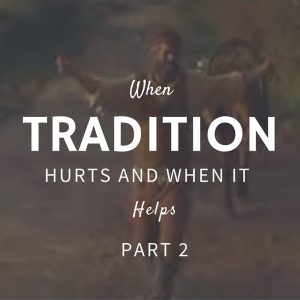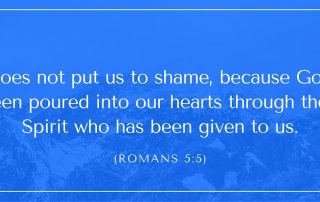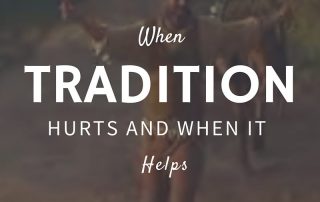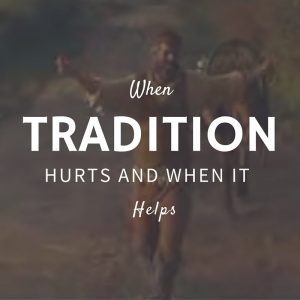 I wrestled with cutting this post into two parts because I was afraid you wouldn’t get to this one. In Part 1 of the post I focused on some of the dangers of tradition. If you haven’t read that, it might help start there. The value of tradition (repeated activities to enforce a set of values) is so great I almost want to say this part is more important than Part 1. I ALMOST want to say that but I can’t bring myself to. As with many of the best things in life balance is the key here.
I wrestled with cutting this post into two parts because I was afraid you wouldn’t get to this one. In Part 1 of the post I focused on some of the dangers of tradition. If you haven’t read that, it might help start there. The value of tradition (repeated activities to enforce a set of values) is so great I almost want to say this part is more important than Part 1. I ALMOST want to say that but I can’t bring myself to. As with many of the best things in life balance is the key here.
As I look back on the first post I wish I had spent more time focusing on the Romans passage that set me on top of my little soup box. That is often how scripture works though, and I don’t want to diminish how beneficial it is to let a bible text quickly bleed into the everyday practical. If we only pick at the text in it’s fine points and never let it’s implications invade our minds and set us to wrestling, then we have not used the text as God intended. Conveniently for me, the natural questions that my first post leaves us with are asked all through out the book of Romans. If there are so many risks to tradition, what value do they have? Should we throw them out? If our brains are hard-wired to shut out overly repetitive activities, should we avoid tradition all together?
For Paul’s readers the questions came in a slightly different way. Then what advantage has the Jew? Or what is the value of circumcision? (Romans 3:1) What if some were unfaithful? Does their faithlessness nullify the faithfulness of God? (Romans 3:3)
There are quite a few questions that Paul tries to address. Remember, for the Jews, tradition is what made them unique, it’s where they found their identity. Paul’s arguments that righteousness comes by faith and that faith was open to both Jews and non-Jews was threatening to derail everything that made them proud. He makes a very strong case that salvation and righteousness comes by faith NOT by rule following or tradition. He goes as far as to prove that their forefather, their hero, wasn’t even righteous because of his rule following. One might think that Paul is trying to get rid of all the dusty traditions and laws that the Israelites held so dear but that isn’t his goal at all. Instead Paul is simply trying to establish proper perspective about tradition. As I said, balance is the key here.
How to Find Balance?
The key to understanding the value of tradition is to remember that tradition is not the end but a means to an end. If you set a tradition in its proper context it can serve you very well in arriving at a destination. If you think that tradition is the destination it quickly leads you off the beaten path into all the pitfalls I wrote about in Part 1. To clarify this, I want to jump into another scripture story that explains this so well.
One Sabbath Jesus was going through the grain fields, and as they made their way, his disciples began to pluck heads of grain. And the Pharisees were saying to him, “Look, why are they doing what is not lawful on the Sabbath?” And he said to them, “Have you never read what David did, when he was in need and was hungry, he and those who were with him: how he entered the house of God, in the time of Abiathar the high priest, and ate the bread of the Presence, which it is not lawful for any but the priests to eat, and also gave it to those who were with him?” And he said to them, “The Sabbath was made for man, not man for the Sabbath. So the Son of Man is lord even of the Sabbath.” (Mark 2:23-28 ESV)
Here you have a similar issue that we have been talking about. The Pharisees are trying to protect that tradition (laws) of the Sabbath. They can’t understand why Jesus, who is supposed to be this great spiritual leader, would let his followers disregard such important traditions. Jesus’ answer to them is that, “the sabbath was made for man, not man for the Sabbath.” I love this line! Jesus never ceases to amaze me with his perfect answers. With this little comment he reorient the value of the tradition as a means to an end. The Sabbath was established by God as a tool to serve his people. They were to rest, they were to reorient their minds onto God, they were to stop working and remember that God was their provider NOT their effort. When Jesus puts this tradition in its proper place it’s value becomes clear. The irony of the Sabbath out of context is that it probably did the exact opposite of what was intended. What should have been a day of rest and rejuvenation was probably a day of high stress for many Israelites who were afraid of making some mistake and braking the rules of the sabbath.
Training in Righteousness
In Part 1, I explained how the repetition of a tradition can reduce one’s mindfulness. The same principle can be applied to positive behaviors. Spiritual behaviors, when viewed as a means to enjoying the gospel they have the ability to train your mind to naturally live righteously. When you recognize that obedience is a means to full life, then you can use various disciplines to train your body in obedience.
I remember a season in life when obeying God’s Word was so easy that I didn’t feel like I even had to try. Right out of high school I went through a season of tremendous discipline (I was almost a modern-day monk). I went to bible college on a campus that had no internet or TV and I arrived with a new passion for my relationship with God. I was also so poor that I couldn’t really afford to leave campus. This campus situation was a huge shift but I was excited so I embraced it and settle into a highly structured life of prayer and study. Early on in this season I understood the grace of God for the first time. I spent that first year studying every facet of this sweet grace that I had discovered.
My experience seemed very different from some of my peers at the school. Most of us started with a similar zeal but for some the zeal dwindled over time and for others it only increased. What was the difference between these two responses to the same environment? I can’t say for sure but I can tell you why my zeal didn’t dwindle. My early discovery of grace and my longing to understand it more is what drove me into deeper levels of discipline. I prayed, I studied, I fasted, and I served so that I could further enjoy grace NOT so that I could earn it. Dallas Willard says “Grace is not opposed to effort, it is opposed to earning. Earning is an attitude. Effort is an action.”
I exerted lots of effort during that season. I even tried forms of discipline I had never tried before, like fasting. But I did it as a means to enjoy grace NOT as a means earn it. Grace is like the fuel of the Christian life, in order to do anything righteous you burn grace. Earning grace is as observed as having to start your car without fuel to prove that you need fuel.
Exactly why some of my peers were not experiencing the same joy and freedom is an unknown but I have a theory. When traditions (disciplines or rules) are followed in order to earn something they have the potential to drain the life out of you. It burns effort rather than burning grace. That situation will kill your joy faster than if you had never tried to be righteous at all. At least there is some temporary joy in sin. This righteousness stuff is ONLY draining when it’s done to earn.
It was during that first year especially that obeying God seemed easy. Purity, kindness, joy, service, became byproducts of my life rather than the pursuit of my life. That ONLY happens when your pursuit is Jesus and his grace. I wish I could say that I have continued that same level of discipline and kept my focus on Jesus and His grace. I haven’t always. I have shifted back and forth between beautiful seasons of soaking in grace to agonizing seasons of trying to earn it.
Traditions and rituals like prayer, scripture reading, community, and service are consistently powerful aids in getting all this right. If you exert effort in these types of traditions the Holy Spirit is very faithful in leveraging them into righteousness. If I go back to the fuel analogy, spiritual disciplines are like pouring fuel into the tank of your soul. It’s the spirits job to turn the key. Just don’t forget, reading your bible is NOT the goal, Jesus is. Praying is NOT the goal, who you are praying to is. Community is NOT the goal, camaraderie in your pursuit of God is. Serving is NOT the goal, following Jesus where he serves is. If you get that perspective right the doors to leverage tradition are open to you.
Connecting Part 1 and Part 2 Further
Here is where things get extra messy. Leveraging tradition (disciplines/rule following) is more art then it is science. The nature of rules and traditions suggest that they are very rigid. After all, you can make lists of rules with check boxes next to them. You can make liturgies with very systematic steps that are easy to duplicate week after week. How is that like art and not like science?
You can be very systematic in your spiritual activities as long as they continue to serve your soul in seeing and enjoying Jesus. As soon as an activity stops helping you see and enjoy Jesus, you might want to adjust that practice. Does that mean the rules in scripture are not concrete? Answering that question is a bit tricky, many of the commands in scripture are absolutely concrete. It will NEVER serve your soul to murder someone. There is no situation where that helps you see and enjoy Jesus. That’s pretty concrete. It will NEVER serve your soul to covet other people things.
There are, on the other hand, some ideas in scripture that don’t make sense to follow. For example; 1 Timothy 5:23 says, “No longer drink only water, but use a little wine for the sake of your stomach and your frequent ailments.” If you are an alcoholic, you should not follow this command. Yes in fact this is a command in this text. Paul is writing to Timothy who has some stomach problems and suggests that wine might help. In our time, Paul might have said, “You should take care of yourself Timothy! Take some Tums or something!”
So, which commands are black and white and which ones are gray? I don’t have time in this blog to go through the entire bible and give you a list and I don’t have the wisdom anyway. When in doubt choose the Law of Love. Jesus said, “You shall love the Lord your God with all your heart and with all your soul and with all your strength and with all your mind, and your neighbor as yourself (Luke 10:27).” Ryan preached a great sermon about this, The Point is a Person. That might help too.
The point is that traditions, laws, and disciplines are meant to serve us. God didn’t make us to serve His rules. I hope that helps.






 I wrestled with cutting this post into two parts because I was afraid you wouldn’t get to this one. In
I wrestled with cutting this post into two parts because I was afraid you wouldn’t get to this one. In 
 In just 4 days, there will be people all around the world who gather to celebrate a belief that Jesus rose from the dead. While there is next to no debate that Jesus of Nazareth existed, lived in the Galilean region, and died on a Roman cross, there is much debate about his resurrection.
In just 4 days, there will be people all around the world who gather to celebrate a belief that Jesus rose from the dead. While there is next to no debate that Jesus of Nazareth existed, lived in the Galilean region, and died on a Roman cross, there is much debate about his resurrection.


